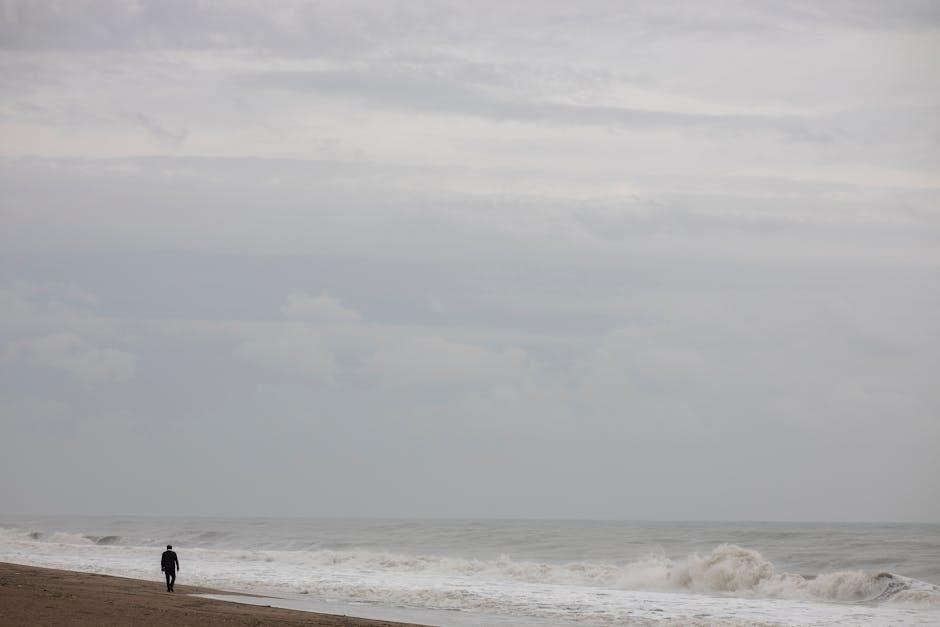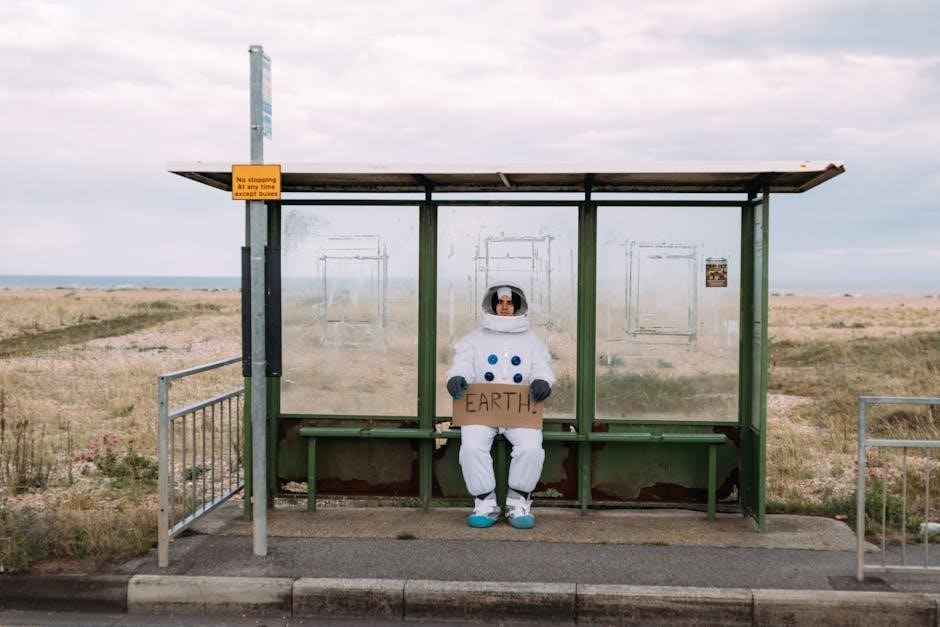the happiest man on earth pdf
Category : PDF
Eddie Jaku’s memoir, The Happiest Man on Earth, is a powerful story of survival, hope, and resilience․ Published by Pan Macmillan Australia, it highlights his journey through the Holocaust and his unwavering belief in gratitude and kindness, offering a timeless message of hope and optimism for readers worldwide․
1․1 Overview of the Book
The Happiest Man on Earth by Eddie Jaku is a poignant memoir detailing his extraordinary journey through the Holocaust․ Available as a free PDF download, the book chronicles Eddie’s survival in concentration camps, his unwavering optimism, and his philosophy on gratitude and kindness․ Published by E-BUKU PSP AMINUDDIN BAKI MRSM SULTAN AZLAN SHAH on January 2, 2023, it offers timeless lessons on resilience and hope, resonating with readers worldwide․ This inspiring story underscores the power of positivity even in the darkest times, making it a must-read for anyone seeking hope and inspiration․
1․2 The Concept of Happiness in the Context of the Book
Eddie Jaku’s memoir redefines happiness as a choice, not a circumstance․ Despite enduring the Holocaust, he embraces gratitude, tolerance, and kindness, believing true happiness lies in mindset, not material wealth․ His promise to smile daily honors the six million Jews murdered, transforming trauma into a testament of hope․ The book, available as a free PDF, shows how Eddie’s philosophy of happiness is rooted in resilience and optimism, offering readers a blueprint to find joy even in life’s darkest moments․ His journey proves that happiness is a conscious decision, empowering others to embrace life’s beauty․

Author Background: Eddie Jaku
Eddie Jaku, a Holocaust survivor, was born in Germany and endured unimaginable suffering during WWII․ His survival story, shared in The Happiest Man on Earth, reflects his resilience, optimism, and dedication to spreading kindness and gratitude, inspiring countless readers worldwide․
2․1 Early Life and Upbringing
Eddie Jaku was born in Germany into a Jewish family, experiencing a nurturing upbringing that shaped his resilience․ His early life was marked by a close-knit family and a strong emphasis on education․Despite the rising tensions of Nazism, Eddie’s parents instilled in him values of kindness and optimism, which later became the foundation of his philosophy․ His formative years were filled with hope and promise, setting the stage for his remarkable journey through one of history’s darkest periods․ This upbringing played a pivotal role in his ability to find happiness even in the face of unimaginable adversity․
2․2 Career and Personal Journey
Eddie Jaku’s career and personal journey are a testament to his resilience and determination․ After surviving the Holocaust, he rebuilt his life, becoming a successful engineer and starting a family in Australia․ His professional achievements were matched by his dedication to spreading kindness and tolerance․ Eddie’s memoir, The Happiest Man on Earth, became a bestselling book, sharing his wisdom and inspiring countless readers․ His journey from darkness to light exemplifies his belief in the power of gratitude and hope, making him a beacon of inspiration for people worldwide․
Historical Context: The Holocaust and Its Impact

The Holocaust was a tragic period marked by unimaginable atrocities, including Kristallnacht․ Eddie Jaku’s imprisonment in concentration camps profoundly shaped his perspective on life and happiness․
3․1 The Holocaust: A Brief Overview
The Holocaust, one of history’s darkest periods, involved the systematic persecution and extermination of six million Jews by the Nazis during World War II․ It began with anti-Semitic laws and escalated into concentration camps, where millions endured unimaginable suffering․ Key events like Kristallnacht in 1938 marked the intensification of Nazi violence․ The Holocaust’s impact on individuals like Eddie Jaku was profound, shaping his resilience and perspective on life․ His story serves as a testament to survival and the enduring power of hope amidst unimaginable horror․
3․2 Eddie Jaku’s Survival Story
Eddie Jaku’s survival story is a testament to resilience and hope․ Arrested during Kristallnacht in 1938, he endured brutal conditions in concentration camps like Buchenwald and Auschwitz․ Despite the horrors, Eddie’s determination to survive and his belief in humanity never wavered․ After escaping a death march, he hid until liberation, later rebuilding his life with gratitude and kindness․ His journey, shared in The Happiest Man on Earth, highlights the power of hope and positivity, even in the face of unimaginable adversity, inspiring readers to embrace life’s beauty and cherish its preciousness․

Philosophical Insights from the Book
Eddie Jaku’s memoir emphasizes gratitude, tolerance, and kindness as essential life principles․ His philosophy, shaped by adversity, teaches that true happiness lies in embracing life’s beauty and simplicity․
4․1 The Power of Gratitude
Eddie Jaku’s memoir underscores the transformative power of gratitude․ Despite enduring unimaginable suffering during the Holocaust, he chose to focus on the beauty of life, vowing to smile daily as an act of gratitude․ This mindset, he believes, is a gift to honor the six million Jews murdered and a testament to resilience․ Gratitude, for Eddie, is not just a feeling but a conscious choice that shapes one’s outlook, fostering hope and positivity even in the darkest times․ His story teaches readers the profound impact of gratitude in healing and finding joy․
4․2 Tolerance and Kindness as Life’s Guiding Principles
Eddie Jaku’s memoir highlights tolerance and kindness as cornerstone values․ Despite the horrors of the Holocaust, he rejected hatred, choosing instead to embrace compassion․ He believes kindness can transform lives and foster harmony․ Eddie’s story illustrates how these principles, learned through suffering, guide his interactions and outlook․ His resilience and optimism are rooted in spreading kindness, a lesson he shares to inspire a better world․ Through his experiences, he teaches that tolerance and kindness are not just ideals but essential tools for healing and building meaningful connections․

Key Life Lessons from Eddie Jaku
Eddie Jaku’s life lessons highlight resilience, gratitude, kindness, tolerance, and the importance of family, guiding us to find hope and happiness․
5․1 Resilience and Optimism in the Face of Adversity
Eddie Jaku’s story is a testament to resilience and optimism․ Despite enduring the horrors of the Holocaust, including concentration camps and personal loss, Eddie emerged with an unshakable belief in the power of gratitude and kindness․ His survival was not just physical but emotional, as he chose to focus on hope rather than hatred․ Eddie’s philosophy emphasizes that happiness is a choice, even in the darkest times, and his ability to find light in despair inspires readers to embrace resilience and optimism in their own lives, no matter the challenges they face․

5․2 The Importance of Family and Relationships
Eddie Jaku’s story underscores the profound importance of family and relationships in shaping his outlook on life․ Despite the immense hardships he faced, Eddie consistently emphasized the strength and love of his family as a source of resilience․ His marriage and children became a cornerstone of his happiness, teaching him the value of nurturing relationships․ Eddie’s belief in the power of family is evident in his heartfelt advice to cherish loved ones, a lesson he carried with him throughout his life․ His story highlights how meaningful connections can provide enduring strength and joy, even in the face of adversity․
The Book’s Structure and Content
The Happiest Man on Earth is structured into chapters, each focusing on key themes like gratitude, tolerance, and kindness․ Available as a PDF, it offers a heartfelt memoir of Eddie Jaku’s life․
6․1 Chapter Breakdown and Key Themes
The Happiest Man on Earth is divided into chapters, each exploring themes of resilience, gratitude, and kindness․ Chapter One highlights values beyond material wealth, while Chapter Two examines how weakness can lead to hatred․ Chapter Three emphasizes survival and moving forward, and Chapter Four showcases kindness in unexpected places․ Chapter Five underscores the importance of family․ Each chapter weaves Eddie Jaku’s personal experiences with universal life lessons, creating a narrative that inspires reflection and hope․ The structure ensures a seamless journey through his life, illustrating his belief that happiness is a choice, even in darkness․
6․2 The Role of Memoir in Sharing Personal Stories
Eddie Jaku’s memoir, The Happiest Man on Earth, serves as a powerful medium for sharing his extraordinary life story․ Memoirs provide a personal and emotional connection to historical events, allowing readers to engage deeply with the author’s experiences․ Jaku’s narrative transforms the Holocaust from a historical tragedy into a deeply human story of survival and hope․ By sharing his journey, he preserves his legacy and offers universal lessons on resilience, gratitude, and kindness․ The memoir format enables an intimate exchange, making his story relatable and impactful for readers across generations․

The Book’s Reception and Impact
The Happiest Man on Earth has received widespread acclaim for its powerful storytelling and universal lessons․ Readers praise its emotional depth and inspiring message of resilience and hope․

7․1 Reviews and Ratings
The Happiest Man on Earth has garnered widespread critical acclaim and heartfelt praise from readers worldwide․ With a 4․8-star rating on Amazon, reviewers describe it as a “life-changing” and “inspiring” memoir․ Many highlight Eddie Jaku’s ability to convey profound hope and resilience despite unimaginable suffering․ The book’s universal themes of gratitude, kindness, and tolerance resonate deeply, making it a favorite among diverse audiences․ Its emotional depth and uplifting message have solidified its place as a bestseller, with readers often recommending it as a must-read for everyone seeking inspiration and a renewed perspective on life․
7․2 The Book’s Influence on Readers
The Happiest Man on Earth has profoundly impacted readers, inspiring a shift in perspective and fostering a deeper appreciation for life․ Many have shared how Eddie Jaku’s story of resilience and optimism has motivated them to embrace gratitude and kindness․ The book’s emphasis on tolerance and hope has resonated particularly with young readers, encouraging them to build compassionate communities․ Its influence extends beyond individual readers, sparking meaningful conversations and reflections on the power of the human spirit․ Eddie’s legacy continues to inspire positive change, leaving a lasting imprint on hearts and minds worldwide․

Eddie Jaku’s story, shared in The Happiest Man on Earth, transcends suffering, offering a legacy of hope, gratitude, and kindness that continues to inspire future generations globally․

8․1 Final Thoughts on the Book’s Message
The Happiest Man on Earth leaves readers with a profound message of hope and resilience․ Eddie Jaku’s story, despite unimaginable suffering, emphasizes the power of gratitude and kindness․ His belief that happiness is a choice, even in darkness, inspires a universal philosophy of living․ The book’s themes of tolerance, family, and hope resonate deeply, offering readers a timeless guide to finding joy and purpose․ It serves as a reminder that life’s beauty lies in our ability to cherish it, no matter the challenges we face․
8․2 The Legacy of Eddie Jaku’s Story
Eddie Jaku’s story leaves an indelible mark on humanity, inspiring future generations to embrace gratitude, tolerance, and kindness․ His legacy transcends his survival of the Holocaust, offering a blueprint for living a meaningful life․ By sharing his experiences, he ensures that the lessons of history are not forgotten, fostering empathy and understanding․ His memoir serves as a testament to the human spirit’s capacity for resilience and hope․ Eddie’s journey reminds us that happiness is a choice, even in the darkest times, leaving behind a timeless message of love, forgiveness, and the enduring power of the human heart․
